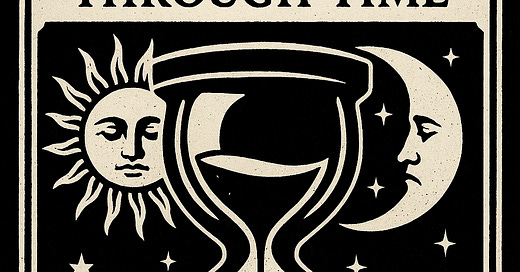Long before the age of castles and moonlit moors, ere the Gothic tradition had taken root, there lay the ancient tale of Gilgamesh, sung in the sands of Mesopotamia some four thousand years past. Here unfolds the saga of Gilgamesh, king of Uruk, half divine, bound by mortal coil, whose heart wrestled with the somber truths of friendship, death, and the elusive dream of eternal life. Though the Gothic night had yet to fall upon the world, within this epic’s depths stir the very spirits that would later haunt the shadowed halls of Gothic lore: the dread of oblivion, the decay of flesh and spirit, quests that trespass beyond mortal bounds, and the ever-looming veil of the unknown. In the weaving of this tale, death sits as a silent sovereign, casting its long and unyielding shadow. A meditation upon the frailty of life and the futility of fleeing the grave. The landscapes are darkened realms, the heroes marked by doom, their souls heavy with the weight of fleeting days.
Thus, The Epic of Gilgamesh stands as a venerable forebear to the Gothic tradition, a wellspring from which its mournful themes arise. Gilgamesh, the Proud and the Tormented At the tale’s dawn, Gilgamesh reigns as a mighty, yet tyrannous king, one who wields his power as a tempest, feared and resented by his people. Two parts god, one part man, he strides alone upon his throne, arrogant, distant, his heart a fortress of pride and despair. This figure, wrapped in isolation and shadow, is the very archetype of the Gothic anti-hero, a soul estranged from kin and kinship alike. Yet fate, in the guise of Enkidu, the wild man shaped by gods’ hands, brings a bond of friendship that tempers Gilgamesh’s iron will.
Their comradeship blooms like a fragile flame, only to be snuffed by Enkidu’s untimely death. A loss that plunges Gilgamesh into a chasm of grief and an obsessive dread of his own mortality, echoing the Gothic preoccupation with death’s cruel dominion over the heart. Decay and the Shadow of Death In Gothic tales, death is no mere passing but a creeping, corrupting force. Enkidu’s demise is drawn with a grim hand: slow, painful, and grotesque.
His vision of the afterlife is a desolate realm, a house of dust and shadows where the dead wander as feathered phantoms, gnawed by clay and silence. Such a vision strips death of all glory, revealing it as decay and eternal captivity, a motif that would echo in the haunted corridors of Gothic fiction. Gilgamesh’s refusal to lay Enkidu’s body to rest until worms emerge from the flesh is a stark, visceral image of decay, a grotesque reminder of the flesh’s frailty that would find kinship in later Gothic horrors. The decaying corpse, the creeping rot, the terrible beauty of corruption. The Dark Quest for Everlasting Life No Gothic tale is complete without the desperate pursuit of forbidden knowledge or eternal life — a quest fraught with peril and despair.
Gilgamesh’s journey beyond mortal realms, through shadowed forests guarded by the monstrous Humbaba, over forbidding mountains, and across the dread Waters of Death, is a journey into the very heart of darkness. Utnapishtim, the ancient bearer of immortality, stands as a relic of a forgotten past, an eternal sentinel caught in endless stasis — a living curse rather than a blessing. Gilgamesh’s failure to grasp the gift of life anew, thwarted by the theft of a mystical plant by a serpent’s cunning, is a solemn testament to the futility that haunts Gothic souls: that no mortal may escape the fate decreed by the gods. Monsters and the Sublime The epic teems with beings that inspire awe and terror alike. Humbaba, the dread guardian of the Cedar Forest, is the Gothic monster incarnate: a terror of nature itself, overcome only through brutal struggle and fraught with moral shadow.
The Waters of Death mark the threshold between the known and the unknowable, a liminal space that whispers of the abyss beyond life. Gilgamesh’s Final Reckoning At journey’s end, the king’s heart alters. He accepts the mortal lot, understanding that true immortality lies not in endless days, but in the lasting walls and stories left behind. The mighty city of Uruk stands as both monument and tomb — a grand yet melancholy testament to human endeavor and its inevitable twilight. Thus, from the dawn of time springs forth the earliest echo of Gothic thought — a hero standing on the edge of the void, gazing into the mysteries of death, loss, and the meaning of existence. Gilgamesh, the first Gothic anti-hero, endures as a shadowed figure whose tale weaves the ancient and the eternal, the mortal and the sublime, into the fabric of dark legend.



